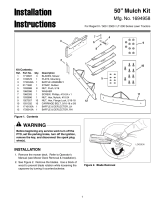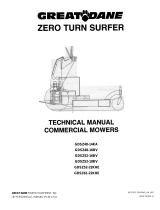
5
BEFORE OPERATION CONSIDERATIONS
(CONT'D)
C. Never remove the gas cap or add fuel with the
engine running. Allow the engine to cool before
fueling.
D. Never fuel the machine indoors or in an enclosed
trailer.
E. Never store the machine or fuel container where
there is an open flame, spark or pilot light such as
on a water heater or other appliances.
F. Never fill containers inside a vehicle or on a truck
or trailer bed with a plastic liner. Always place
containers on the ground away from your vehicle
before filling.
G. Remove the machine from the truck or trailer and
fuel on the ground. If this is not possible, then
refuel the machine with a portable container,
rather than from a gasoline dispenser nozzle.
H. Keep the nozzle in contact with the rim of fuel
tank or container opening at all times until fueling
is complete. Do not use a nozzle lock-open device.
I. If fuel is spilled on clothing, change clothing
immediately.
J. Replace gas cap and tighten securely.
5. Operator hearing protection is recommended,
particularly for continuous operation of the mower.
Wear suitable hearing protection. Prolonged
exposure to loud noise can cause hearing impairment
or hearing loss.
4. Always wear appropriate clothing, loose fitting
clothing, long hair or jewelry could get tangled in
moving parts. Do not operate the machine wearing
shorts; always wear adequate protective clothing
including long pants. Wearing safety glasses, safety
shoes and a helmet is advisable and is required by
some local ordinances and insurance regulations.
6. Keep the machine and attachments in good operating
condition. Keep all shields and safety devices in
place. If a shield, safety device or decal is defective
or damaged, repair or replace it before operating the
machine.
This machine is equipped with an interlock system
intended to protect the operator and others from
injury. This is accomplished by preventing the
engine from starting unless the deck drive is
disengaged, the parking brake is on, and the speed
adjustment lever is in the neutral position. The
system shuts off the engine if the operator releases
the operator presence levers with the deck drive
engaged and/or the speed adjustment lever not in
the neutral position, or the parking brake
disengaged. Never operate equipment with the
interlock system disconnected or malfunctioning.
WARNING:
7. Fill the fuel tank with clean, fresh gasoline, with a
minimum octane rating of 87. To avoid personal
injury or property damage, use extreme care in
handling gasoline. Gasoline is extremely flammable
and the vapors are explosive.
A. Extinguish all cigarettes, cigars, pipes and other
B. Use only an approved gasoline container.
8. Before attempting to start the engine, move the
speed adjustment lever into the neutral position, move
the blade engagement switch to the OFF position,
apply the parking brake, and move the neutral latches
to neutral.
9. The discharge chute must always be installed and in
the down position on the side discharge cutter deck
except when the Scag optional grass catcher or
mulching plate are properly installed.
sources of ignition.
WARNING
DO NOT OPERATE WITHOUT DISCHARGE CHUTE, MULCHING
KIT, OR ENTIRE GRASS CATCHER INSTALLED

























